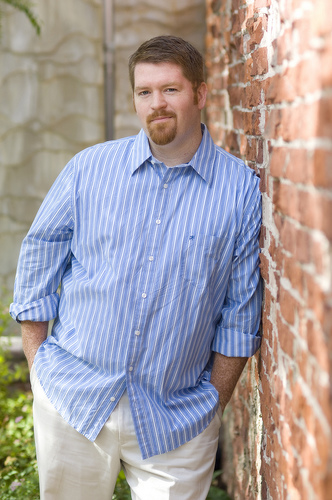Hey guys I'm back! Due to me working this past weekend literally all day, every day I wasn't able to post some more posts for the Birthday Bash! But we're still a few days away from the end and there's enough time for them to go up now! So bam! Today I bring to you Andy Gavin, a really awesome author and he writes well at that! Who knew?! >.>
He was awesome enough to give me a guest post that is actually pretty awesome to read! So I present to you; Andy Gavin!
____________________
Modern man has a wide variety of "pure" storytelling mediums, like film, long form television, and novels. While these have some very significant differences they all share the same basic focus on plot and character. Typically at least, good stories introduce a character with problems, get you to like them, then chronicle the struggle as they are compelled to change and adapt to overcome these problems. In the end, they either do so, or are defeated to teach us a lesson (a variant we call tragedy).
These elements: character, plot, and transformational arc, are completely central to the normal story (I deliberately ignore weird experimental storytelling). Really, they are the core of what makes a good film or novel.
But with a game, this whole business is secondary. The primary focus of a game is fun. And fun through gameplay. Does
Tetris have any character or plot? Or even
Doom? No. But they were fun games. Really fun. Games such as
Naughty Dog's Jak & Daxter or
Uncharted strive to bridge these gaps by offering both. This is very difficult because they don't really serve each other.
The gameplay for
Uncharted 2, for example, has three primary modes: survival gunplay, platforming, and puzzle solving. The player must assess the layout of the level, learn it, and navigate it without getting killed. This involves anticipating the enemies and taking them out first. You use the weapons at your disposal, the mechanics, and the terrain provided to do so. With platforming you need to come to understand what the character can do physical, find your way, and successfully traverse the route.
When these are done well, when the design is varied, the levels pretty, the enemies cool, and the challenges measured, challenging and above all, doable - it's fun.
Uncharted 2 is such a game. It also has a pretty darn good story which is woven in with the design of the levels and the challenges. This adds to the whole thing. Watching the next segment of story becomes part of your reward for finishing a segment. There is a tremendous level of art that goes into getting both of these to work at the same time, but certainly each is constrained at times by the needs of the other.
Content in games is expensive and difficult to make. Therefore it needs to repeat. You really do need to shoot the same enemy hundreds of times. Otherwise the enemy isn't providing enough mileage to justify the labor involved to create him. The player is also in control and therefore the consequences of his play affect success or failure.
But in storytelling, success and failure are the carefully monitored heartbeat of any good story. You bring the protagonist up, dash him down, grind him into the ground, lift him up, slam him sideways. I knew this intuitively when writing my first novel,
The Darkening Dream. I've read so many books and watched so many films and shows that it seemed "obvious." But at the same time, it turned out to be far from easy. Writing a good story has less constraints than making a good game, but it's still extremely difficult. You need to be constantly balancing the issues of character, motivation, the logic of the plot, and the need to seesaw the dramatic tension. In the end stylistic concerns sometimes overwhelm dramatic ones (to the reader's detriment).
In a game, it's even more complicated, and there is barely a chance of hitting all the right dramatic notes. The player has a lot to say about this natural up and down pacing, so the story-based game tries to separate how well you are really doing from the actual plot. Usually death of failure in the game causes the player to merely repeat some segment of the game (and hence the story), when they finish the level and get the next segment of storytelling, they'll get it regardless of whether they died once or 100 times. The better player merely proceeds faster.
This is different, but even more problematic in a less linear game such as World of Warcraft. There, the mechanics of the game heavily distort the conceits of storytelling. The story is even broadly linked to the chronological evolution of the game in real time. For example, in December of 2009 Blizzard released the Icecrown Citadel patch of
Wrath of the Lick King, making it possible for players to finally reach and confront the ultimate boss of the expansion (the titular Lich King). But the fact is, in order to properly maintain the reward mechanics of endgame raiding, each character was and often did, progress through this segment of the story once, or even twice a week.
Now, two years later, the Lich King has been defeated, the world of Zeroth has been broken, yet it's still possible to go back to Icecrown and take on Arthas again. And again. Ditto for any of the several hundred even older bosses. Players accept that they have random access to a long and convoluted story. In fact, the need to generate so much gameplay in WOW has created a body of lore that gives the
Silmarillion a run for its money. But the way in which it's experienced mutes the emotional intensity.
What really provides the excitement in WOW (and many other games), isn't the question of whether the dragon queen Onyxia lives or dies, but the -shall we dare say- drama of whether she does tonight, for us, the group fighting her. And more importantly, will she drop the Nemesis skullcap (arbitrary cool piece of loot) one has been trying to get for six months.
____________________
That was one awesome ass guest post, especially since because being a geek, I understood everything he was talking about and all the things he referenced. So I want to thank you, Andy Gavin, for being awesome and helping me out and giving what you could during the event. I want to thank you for that very first email you sent that got to let me know both you as an author and your work. Here's to many years of you writing!
If you want to check out more about Andy, and of course you do, be sure to check out his;
Website:
http://all-things-andy-gavin.com/
Twitter:
@asgavin
And don't forget to check out all of the posts from the beginning;














































